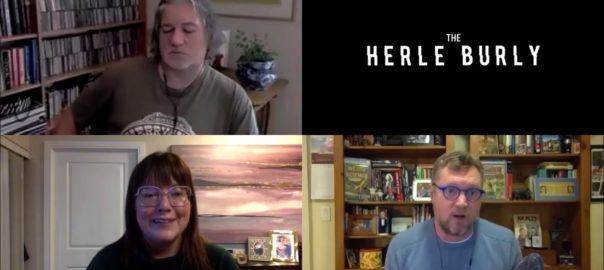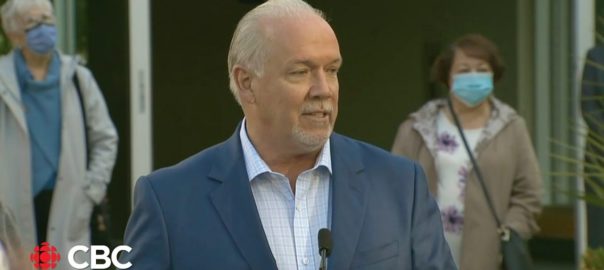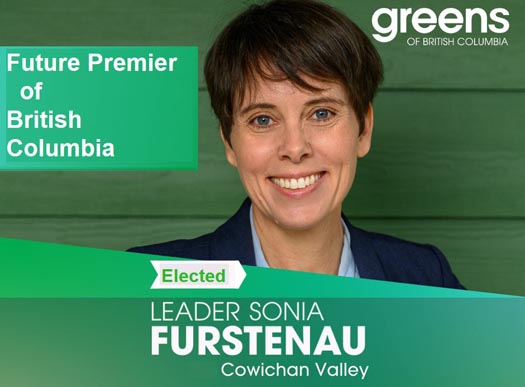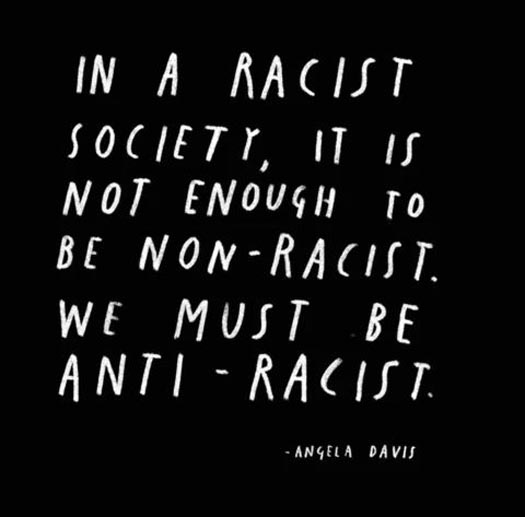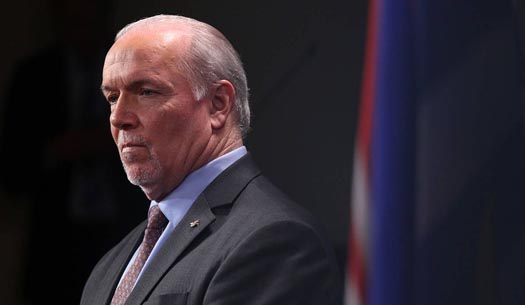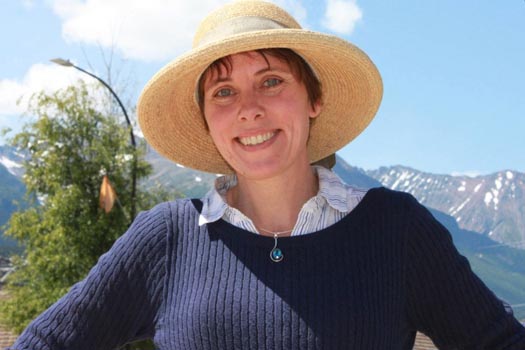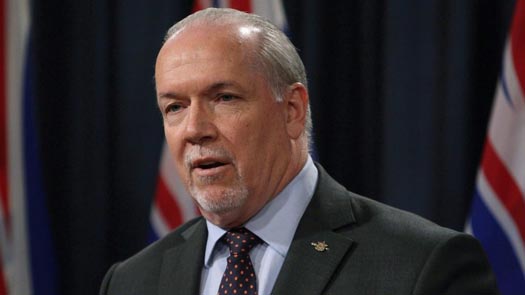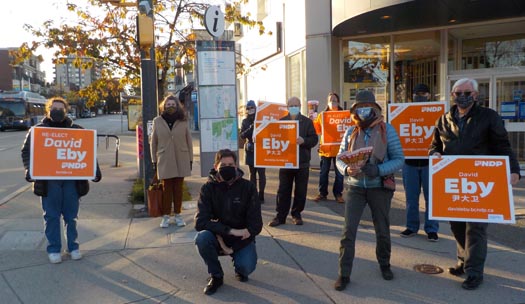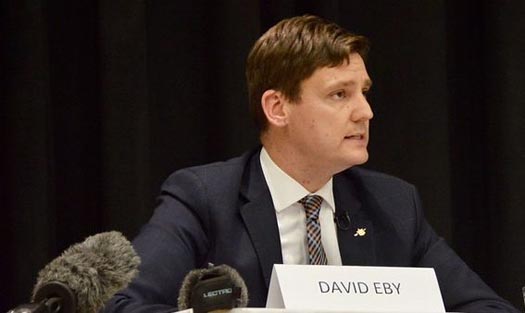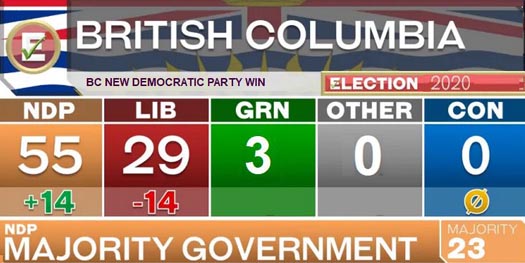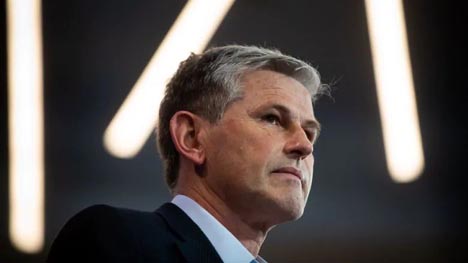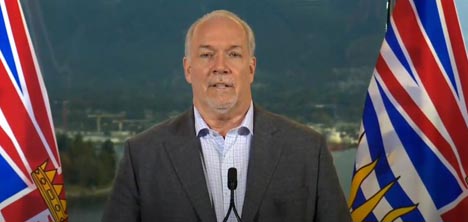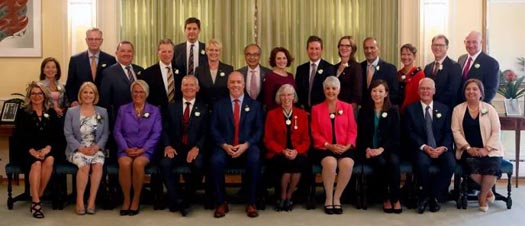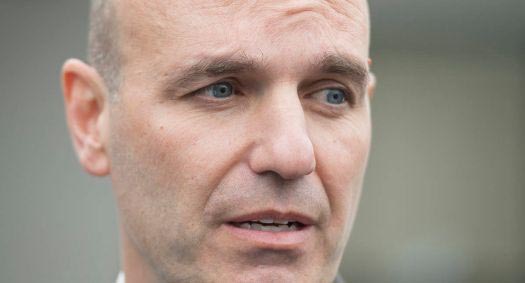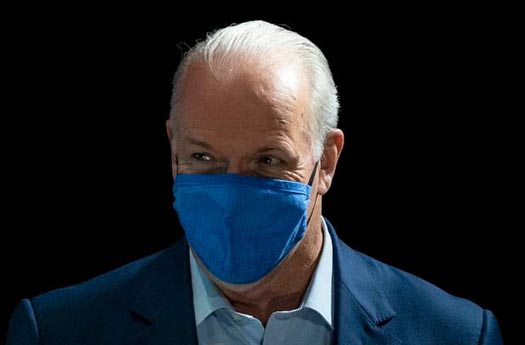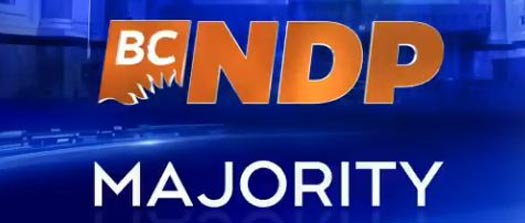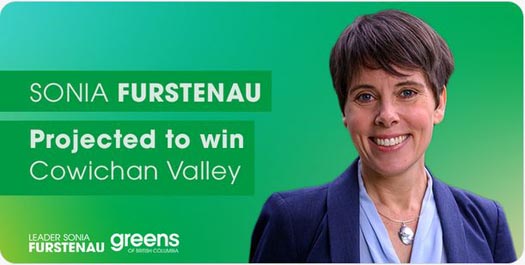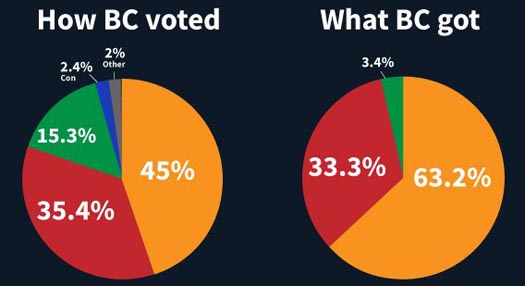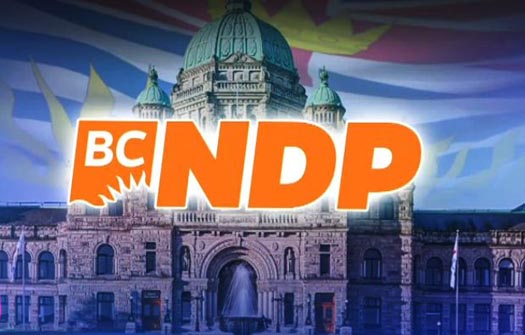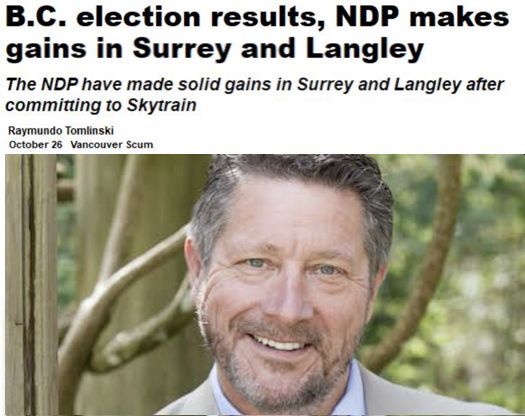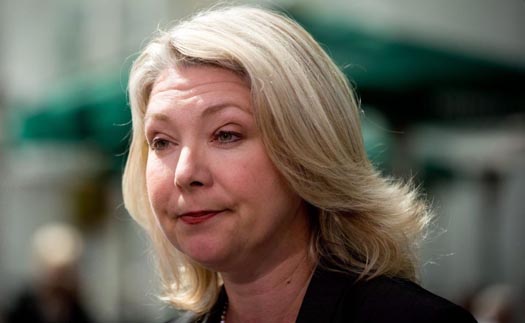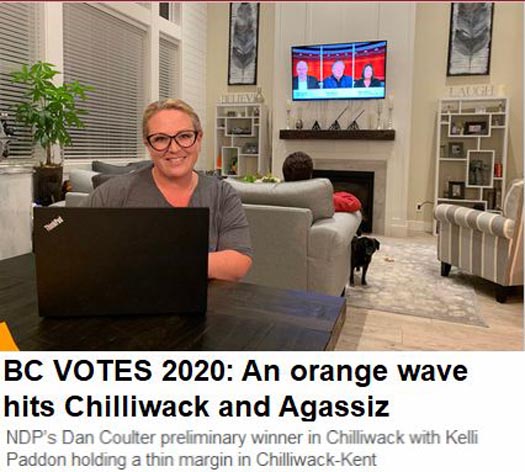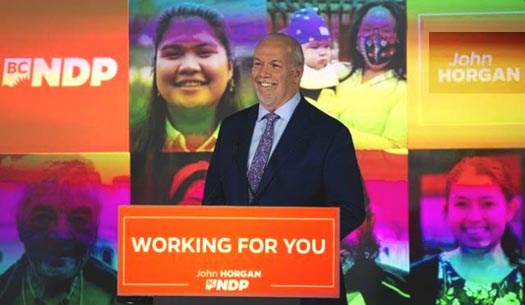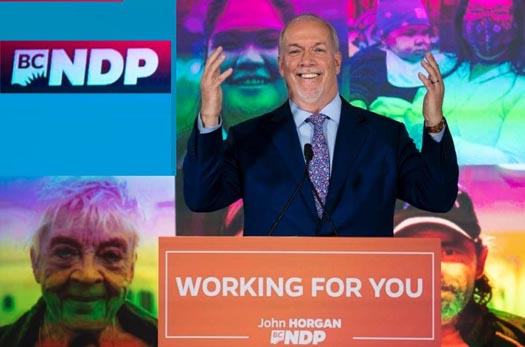
In today’s wrap-up coverage of Decision 2020, in the main, we’re going to turn the column over to the reflections of others who’ve weighed in on the recently-completed, but not yet over, British Columbia provincial election.
That said, before we move to the observations of others, VanRamblings would like to weigh-in on what we consider to be the historic re-alignment of politics in British Columbia, and what that means for us going forward.
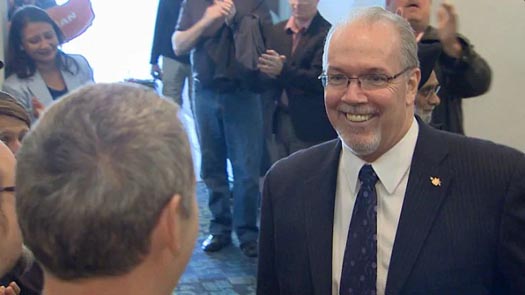 John Horgan assumes the leadership of the B.C. NDP on Thursday, May 1st, 2014
John Horgan assumes the leadership of the B.C. NDP on Thursday, May 1st, 2014
Since being acclaimed the leader of the B.C. NDP on May 1st 2014 — replacing Adrian Dix, who had failed miserably in the 2013 provincial election — John Horgan has taken the British Columbia New Democratic Party to the centre of the political spectrum, assuming the ground occupied by the B.C. Liberals as a resource extraction, pro-LNG, Site C dam loving, moving at a snail’s pace on promised social programmes like $10-a-day child care, and as a balanced budget loving provincial political party.
In other words, the B.C. NDP have become what the B.C. Liberals should have become following the defeat of the Christy Clark government in 2017 — as Wilkinson moved the party to the right, as a coalition of right-of-centre federal Liberals, and far right-of-centre Stephen Harper Conservatives, all the while failing to take the pulse of British Columbians, who in 2020 are no longer enamoured of the anti-union, corporate-backed politics British Columbians largely supported over the past 70 years, from the era of Wacky Bennett, to “Son of Bennett,” former Mayor and Premier Gordon Campbell — who on election tore up dozens of negotiated collective agreements — and vapid talk show host made good, Christy Clark.
With the BC NDP now occupying the centre of the political spectrum, and the B.C. Liberal Party set to transform into a Brad Wall-Scott Moe Sask-Party-style right-of-centre B.C. Party, as we wrote yesterday, the left side of the political spectrum in British Columbia has been ceded to Sonia Furstenau and Adam Olsen’s re-imagined eco-socialist B.C. Green Party.
VanRamblings is predicting that Premier John Horgan will step down in late 2023, with the leadership of the B.C. NDP going to his preferred successor, David Eby, or to the charismatic member for the Stikine riding, Nathan Cullen. With either leader, the B.C. New Democratic Party will be returned to government in 2024, for a third term of office in the province’s capital.
All governments have a shelf life, though — and that will be the case with the B.C. NDP when the 2028 provincial election is called.
By that time, B.C. Green leader Sonia Furstenau will have had ample time to define her party in the eyes of British Columbians.
Upon completion of the 2024 provincial election, VanRamblings predicts that the B.C. Greens will have picked up another half dozen seats in the Legislature, and in 2028 will have added more, for a total seat count that includes all of the following ridings: Victoria-Beacon Hill, Oak Bay-Gordon Head, Saanich and the North Islands, Saanich-South, Esquimalt-Metchosin, Parksville-Qualicum, Nanaimo, Nanaimo-North Cowichan, Cowichan, Courtenay-Comox, North Island, Powell River-Sunshine Coast, Vancouver-False Creek, West Vancouver – Sea to Sky, New Westminster, Nelson-Creston, and Kootenay West, with the B.C. Greens holding the balance of power in a coalition-style British Columbia minority NDP government.
In the eventuality outlined directly above, by 2028, now a well-seasoned politico, B.C. Green leader Sonia Furstenau will hold the whip hand, in support of minority NDP government — given there’s no way a B.C. Green Party could support a right-of-centre B.C. Party, although she could hold the potential for that possibility over the heads of the B.C. New Democrats.

Now onto the observations of others, including the political strategists who comprise the endearing and engagingly foul-mouthed, beloved by many (including me), and well-experienced political difference makers — the rumpled David Herle, the good looking Scott Reid, and the swears-like-a-drunken sailor, Jenni Byrne — who over the course of the past 40 years have helped shape Canadian politics, mostly at the federal level, but often enough, too, at the provincial level: the wily, riotously humourous, utterly non-rancorous, incredibly bright, truth-telling, and — believe it or not — non-partisan panel who comprise The Herle Burly podcast, a must-listen for anybody who has a life, cares even a whit about the state of our nation, and gives a good galldarn about how the sausage is made, and how decisions are arrived at in government that determine how our lives are lived in this country we call Canada — surely, that must be you.
David Herle, Scott Reid & Jenni Byrne on British Columbia’s Decision 2020 provincial election — guaranteed to be the best thing you’ll hear all day.
Let’s excerpt a number of comments made by political pundits published on The Tyee post-election, in a story titled, So, What Does BC’s Election Outcome Really Mean? Here a few of the more provocative insights …
UBC Political Science prof, Max Cameron
Several conditions contributed to the success of John Horgan’s NDP. First, the world is going through a social democratic moment. Social democracies in other places have managed the COVID-19 pandemic effectively, in part because they have invested in universal health care and economic security …
Second, the NDP government has shown that it pays to listen to science and make policies informed by evidence. Elected officials — notably Adrian Dix — worked closely with public health officers — especially Dr. Bonnie Henry — to win the trust of the public and mobilize support for public health directives …
Third, the NDP benefited from a minority Parliament. Minority situations encourage governments to be cautious, responsive and to hew closely to public opinion. Working within a historic Confidence and Supply Agreement with the BC Greens, the NDP ran a government that made few errors and suffered few scandals.
Finally, new campaign finance rules introduced by the NDP eliminated corporate and union donations and capped contributions from individuals. This levelled the playing field.
Karen Ward: With your majority, NDP, ‘choose to be brave.’
British Columbians rejected the vicious politics of Wilkinson’s Liberals. They don’t like it when you use people in trouble as a weapon to punish them further. I hope the message to the NDP is clear: Be brave.
Alex Shiff, former BC Liberal spokesperson
While the BC Liberals needed to win back suburban Metro Vancouver swing ridings that they lost in 2017, the BC NDP was able to defend those ridings while pushing deeper into the Fraser Valley. The BC NDP was able to scoop up voters who decided that John Horgan’s first term as premier was not the radical activist administration that some had predicted, and a change in government in the middle of a pandemic was ultimately not what the doctor ordered.
The results represent an inflection point for the BC Liberals. The party needs to find a way to regain their appeal to suburban and urban ridings in Metro Vancouver, who, along with the party’s dominance in rural communities, were key to a pathway to the premier’s office.
Mario Canseco, Research Co, B.C. polling firm
The BC Liberals have a monumental dual task ahead: a need to reconnect with federal Liberal Party voters who did not feel uncomfortable voting for the BC NDP in this election, and ensuring that voters do not see the BC Conservatives as a more palatable option in 2024 or during any byelections that happen before then.
It was going to be a daunting task for any opposition party to erase the emotional edge that the handling of COVID-19 had bestowed upon the BC NDP. This is the first provincial election in this century where the incumbent premier had an approval rating higher than 60 per cent heading into election day. The BC Liberals certainly faced difficulties adapting to a campaign that minimized their natural strengths: the ability to fill rooms of supporters who wanted to hear the leader speak and an effective get-out-the-vote operation when more than half a million voters requested packages to vote by mail.
George Abbott, former BC Liberal MLA and Cabinet Minister
The Liberal campaign struck me as largely tone deaf around the issue that dominates public concern: the pandemic. If a BC Liberal government was prepared to offer up $10 - 11 billion in stimulus spending (a short-term elimination/reduction of provincial sales tax), a more imaginative platform might have embraced, for example, a billion dollar program for climate-proofing communities from wildfire and flood. The best stimulus programs deliver a “triple word score:” create or protect jobs, generate spin-off economic activity and enhance community safety and services.
As we bring VanRamblings’ post-mortem coverage of Decision 2020 to a close, we’ll leave you with this thought, that will likely gladden the heart of Sharon Gregson, as well as the working moms who’ve had to remain at home during the pandemic to care for their children: the biggest mistake made by the NDP in this election was in not identifying child care as both an economic and a feminist issue, and promising dramatically increased funding and near immediate movement towards $10-a-day and greatly expanded child care, allowing mothers to return to work while building the economy — which is a critical concern going forward — while showing a greater degree of caring and compassion for the children of the province.
While John Horgan promised free transit for children 5 – 12 years of age, that initiative failed to meet the needs of working families with teenage children who, as is the case in Surrey, must walk 5.8 kilometres, as the crow flies, to their school before becoming eligible for busing. At the very least, the John Horgan government could have promised to halve the fare for children aged 12 – 18 — a necessary initiative they failed to implement.
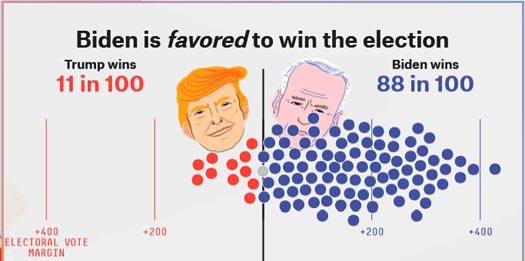
C’mon back Monday & Tuesday for VanRamblings’ take on the November 3rd U.S. Presidential election, where Democrats hope to win the Presidency, and both houses of Congress — and return sanity to all of our lives.

In the meantime, tomorrow you can look forward to our regular Arts Friday coverage, on Saturday a new Stories of a Life, and then … Music Sunday.
